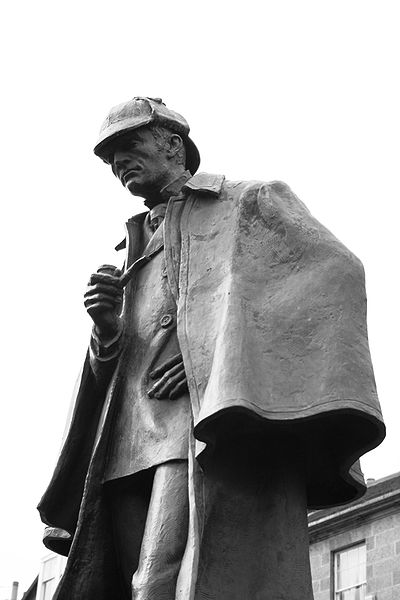TEC (tek)
A
police detective
Common clues: Gumshoe;
Short investigator; Private eye; P.I.; Sleuth; Clue hunter,
informally; Sam Spade, e.g.; Sherlock; Spade or Hammer; Clouseau
or Poirot
Crossword
puzzle frequency:
3 times a year
Frequency
in English language:
14852 / 86800
Video: Learn
How to Become a Private Investigator
It is ridiculous to set a detective story in New York City. New York City is itself a detective story. ~ Agatha Christie
A detective is an investigator, either a member of a police agency or a private person. Private detectives usually operate commercially and are licensed. They may be known as private investigators (P.I.s or "private eyes"). Informally, and primarily in fiction, a detective is any unlicensed person who solves crimes, including historical crimes, or looks into records.

Statue
of Sherlock Holmes on Picardy Place in Edinburgh, Conan Doyle's
birthplace
In some police departments, primarily in North America, Detective can be the lowest rank among investigators (above the lowest rank of officers and below Sergeant). Some departments have distinct levels of detectives, depending on their experiences and skills. New York City Police Department and Los Angeles Police Department, for example, both have three grades. Most larger police departments have rank structures for their investigators that parallel the "street" police, such as Detective Sergeant and Detective Lieutenant.
Detectives have a wide variety of techniques available in conducting investigations. However, the majority of cases are solved by the interrogation of suspects and witnesses, which takes time. Besides interrogations, detectives may rely on a network of informants they have cultivated over the years. Informants often have connections with persons a detective would not be able to approach formally.
Physical forensic evidence in an investigation may provide leads to closing a case.
Examples of physical evidence can be, but are not limited to:
Fingerprinting of objects persons have touched
DNA analysis
Luminol to detect blood stains that have been washed
Bloodstain pattern analysis
Footprints or tire tracks
Chemical testing for the presence of narcotics or expended gun propellant
The exact position of objects at the scene of an investigation
Many major police departments in a city, county, or state, and the Federal Bureau of Investigation, maintain their own forensic laboratories.
Detectives may use public and private records to provide background information on a subject. These include:
Fingerprint records. In the United States, the FBI maintains records of people who have committed felonies and some misdemeanors, all persons who have applied for a Federal security clearance, and all persons who have served in the U.S. armed forces
Records of criminal arrests and convictions
Photographs or mug shots, of persons arrested
Motor vehicle records
Credit card records and bank statements
Hotel registration cards
Credit reports
Answering machine messages
This article is licensed under the GNU Free Documentation License. It uses material from the Wikipedia article "Detective".
|
|